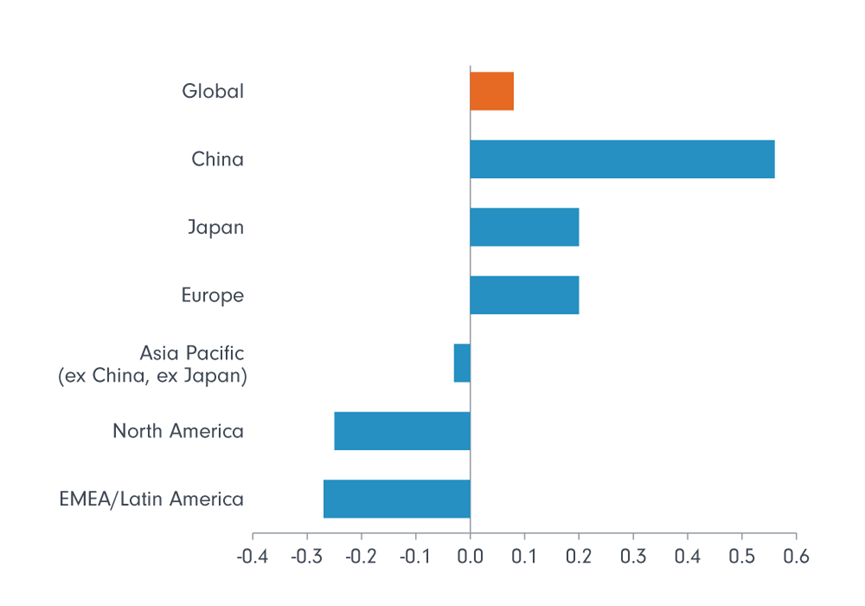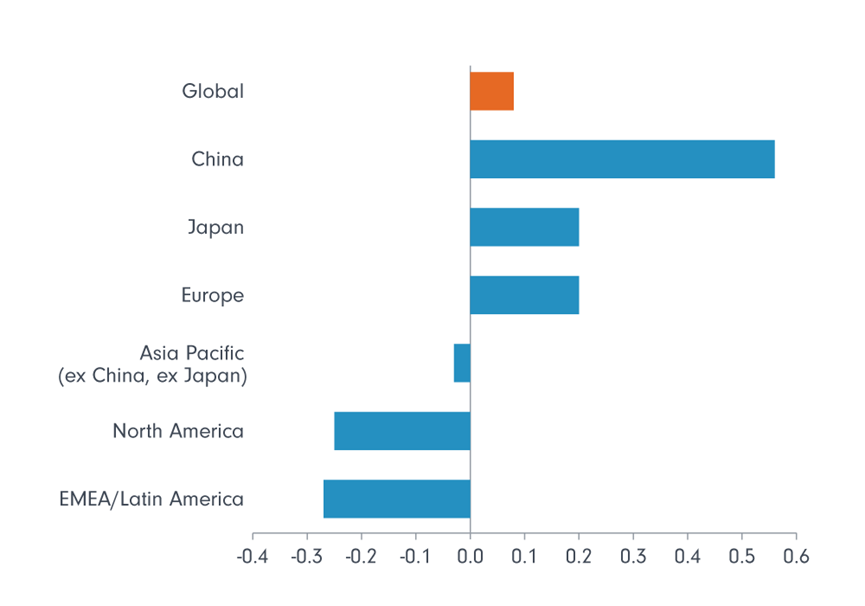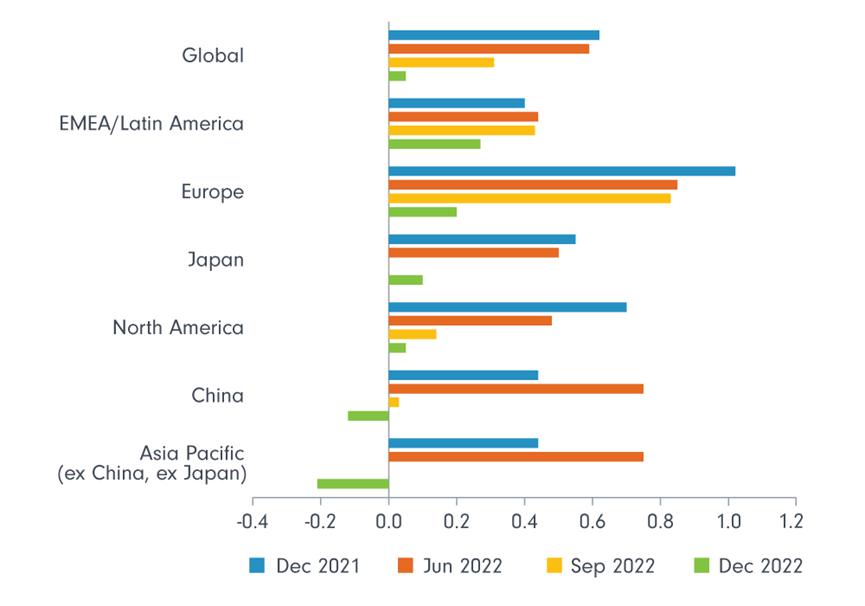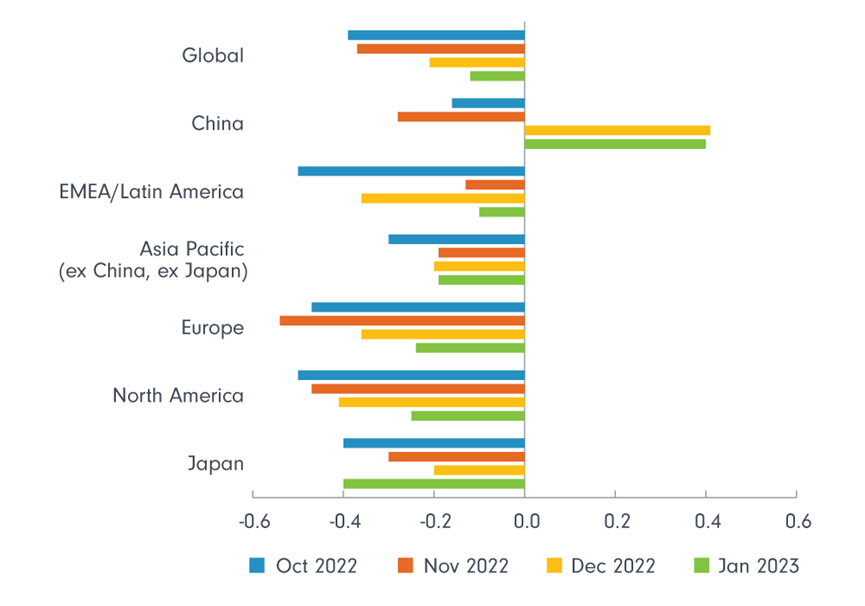China entered 2023 with all the ingredients for recovery in place: inflation showing signs of peaking, management sentiment on the rebound, and policymakers putting an end to tough Covid lockdowns while also rolling out economic stimulus measures.
“As China emerges from its Zero Covid Policy, economic activity is likely to ramp up starting from the first quarter of 2023,” says a Fidelity fixed income analyst covering industrials. “Projects that local government financing vehicles had delayed due to Covid are likely to restart,” the analyst added.
Once again, China’s economy looks to be at a different point in the business cycle. Encouraged by a faster-than-expected reopening and strong policy stimulus, the majority (a lucky 88 per cent) of our China analysts expect their sectors to be in early- or mid-stage expansion in 12 months’ time, compared with 35 per cent of analysts covering North American companies or 37 per cent covering European ones.
Most of our analysts covering the country expect to see revenue growth over the next 12 months.
Chart 1: China leads in expectations for revenue growth*

*X-axis = Weighted net responses
Question: “What are your expectations for revenue growth over the next 12 months?” Chart shows proportion of responses reporting expected increase in revenue minus those expecting a decrease. Strong positive or negative responses receive a double weighting. Higher values show analysts on balance expect revenues to increase. Source: Fidelity International Analyst Survey 2023.
China is also the only place where analysts forecast an overall increase in earnings margins, and the only place where the average return on capital (ROC) is expected to rise in 2023.
Chart 2: Bucking the trend for returns on capital*

*X-axis = Weighted net responses
Question: “What is the outlook for overall returns on capital for your companies for the next 12 months?” Chart shows the proportion of analysts expecting returns on capital will increase minus the proportion expecting they will decrease. Strong positive and strong negative responses receive a double weighting. Higher values show analysts on balance expect returns on capital will increase.
Asked about the principal source of higher return on capital (ROC) this year, some 36 per cent of our China analysts cite cost reduction, while another 36 per cent point to strong growth in end demand.
Cost deflation starting to hit Asia
China and the rest of Asia ex-Japan also stand out as the only region where, on balance, Fidelity analysts expect companies’ input costs will fall in 2023. “Labour and supply shortages are unlikely to impact my companies,” says an equity analyst covering Chinese financial firms. “There is also government pressure for financial institutions to cut compensation for their workers in the name of ‘common prosperity’,” the analyst added.
Cost inflation has also eased for technology hardware companies in China and other parts of Asia, says an equity analyst covering information technology (IT).
“Supply shortages are easing for foundries, which is good for downstream semiconductor firms,” says the IT analyst, adding: “With easing supply of semis and related components, cost pressures for downstream tech hardware will also ease.”
Chart 3: Input cost pressures expected to fall in China and Asia this year*

*X-axis = Weighted net responses
Question: “How, if at all, do you expect inflationary pressures within your companies’ cost bases to change over the next 12 months?” Chart shows proportion of responses reporting costs are expected to increase minus those reporting costs are expected to decrease. Significant increases and significant decreases receive a double weighting. Higher values show analysts are, on balance, reporting greater cost pressures at the companies they cover. Source: Fidelity International Analyst Survey 2023.
Indeed, nearly two-thirds of China analysts say cost pressures had already peaked by the end of 2022 for the companies they cover, the highest among all regions. Similarly, about 60 per cent of Asia Pacific analysts believe they have seen the worst of cost inflation.
Sentiment spikes
Adding to the bullish tone, in our most recent monthly surveys, which pick up shorter-term shifts in mood, China emerged as the only region with analysts reporting positive sentiment among company managers for both December and January. It was in December that China started easing lockdowns and preparing for reopening.
Chart 4: China’s reopening promise has boosted management sentiment

Question: “Based on your interactions with companies over the past month, to what extent, if at all, has your perception of management sentiment over the next six months changed?” Chart shows proportion of responses reporting positive management sentiment minus those reporting negative management sentiment. Strong negative and strong positive responses receive a double weighting. Higher values show analysts are, on balance, reporting more positive sentiment among the companies they cover, lower values more negative sentiment. Source: Fidelity International Analyst Survey 2023.
However, this optimism is tempered by concerns over a possible Covid resurgence, as China has swung from zero tolerance for infections to a fast reopening.
Covid exit will be “a bumpy ride”
“We have yet to see the impact of this very rapid opening up,” says an equity analyst covering financials. “Some companies might see a weaker near-term performance given employee absence.” He added that China’s recovery will be “a bumpy ride before Covid cases normalise”.
Real estate is one sector particularly vulnerable to a Covid resurgence, which may discourage homebuyers or cause delays in their purchases. The Chinese government has rolled out stimuli such as a reduction in mortgage rates following a sharp decline in home sales last year.
“On the one hand, it’s clear that policymakers are now very keen to stabilise the housing market,” says a fixed income analyst covering real estate, “But on the other hand, surging cases are likely to continue to drag on property sales in the near term.”
Despite these risks, China’s outlook is indeed brightening. There will be some tentative hops along the way, but overall we expect China to bounce back decisively in the Year of the Rabbit.
